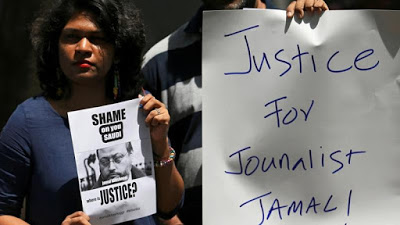Time to end impunity for crimes against journalists
 |
| Thomas Hughes 2 Nov 2018 |
From Khashoggi’s brutal murder to the killing of Daphne Galizia, crimes against journalists still go unpunished.
The murder of Saudi journalist Jamal Khashoggi is extraordinary, not because of the brutal way he was killed, nor because those who did it are unlikely to be held to account. It is extraordinary because it has become international news in a world where violence against journalists is increasingly the norm.
In 2017 alone, 78 journalists were murdered, and thousands more assaulted or imprisoned for their work. On average, only one in 10 of those who commit violence against journalists are convicted of their crimes. In countries like Mexico, where 12 journalists were murdered in 2017, virtually no perpetrators are convicted.
Even in Europe, a supposedly safe place for journalists to work, there are worrying cases of murders of journalists. The family of Maltese investigative journalist Daphne Caruana Galizia are still waiting for justice, one year after she was killed by a car bomb.
Today is the Day to End Impunity for Crimes against Journalists when civil society calls on governments to take action and bring to justice those who are guilty of killing journalists such as Khashoggi and Galizia.
But these violent acts do not occur in isolation, nor are they the only threat facing journalists today.
Among the international leaders who have condemned Khashoggi’s murder is Turkey’s President Recep Tayyip Erdogan, who without apparent irony said: “From the person who gave the order, to the person who carried it out, they must all be brought to account.”
Since the attempted coup in 2016, Erdogan’s government has systematically destroyed the independent media in Turkey. Currently, 174 journalists are in prison, including Ahmet Altan and five other media workers whose life sentences were upheld by a Turkish court a few weeks ago, calling into question the fairness of these trials.
US President Donald Trump also commented on the killing of Khashoggi, showing perhaps uncharacteristic self-awareness, when he acknowledged his own criticism of the media. When asked to comment on the implications of the Saudi involvement in Khashoggi’s murder, Trump said: “There’s a lot of stake, maybe especially so because this man was a reporter, there’s something, you’ll be surprised to hear me say that, there’s something really terrible and disgusting about that.”
Just days later, the US president chose to celebrate violence towards journalists, when he expressed support for Republican Congressman Greg Gianforte, who was found guilty of assaulting a Guardian journalist in 2017. He told a rally in Montana: “Any guy that can do a body slam, he’s my kind of… he’s my guy.”
Since announcing his campaign for presidency, Trump’s vilification of the press has been relentless whether at rallies, White House press conferences or through more than 1,000 critical tweets. He has repeatedly dismissed criticism as “fake news”, called the press “the enemy of the people” and even mocked a reporter’s disability. Trump’s response to a bombing campaign that targeted CNN, George Soros and the Clintons, was to blame the media.
Verbal attacks are not the same as violent attacks, but they contribute to a hostile environment that makes being a journalist in 2018 such a dangerous job. The US media have some of the best protections in the world, yet there has been a decline in press freedom in recent years, and this has a global effect.
Trump’s embrace of “fake news” as a defence has been adopted by other leaders to deflect criticism. Aung San Suu Kyi’s government used it to rebuff accusations of ethnic cleansing of the Rohingya people in Myanmar. Syrian President Bashar al-Assad used it to dismiss an Amnesty International report into the torture and execution of thousands of detainees. In Bahrain, the head of the Bahrain Center for Human Rights, Nabeel Rajab, was even sentenced to two years in prison for broadcasting “fake news”.
In September 2018, the UN Human Rights Council adopted a new resolution on the safety of journalists, which called, among other things, for an end to the denigration of journalists by politicians and public officials.
It acknowledges that these attacks undermine the public’s trust in the independent media and puts all those who work in this field at risk. In addition to specific calls to protect women journalists, the resolution calls for states to adopt national strategies to combat the appalling rates of impunity that exist today.
It is shocking that a day like today is needed to remind the world that when it comes to journalists, criminals are literally getting away with murder.
Governments are either fully committed to the freedom of the press or they are not. Political leaders cannot pick and choose the journalists whom they think are worthy of protection. They cannot condemn violence, yet denigrate the media at every opportunity. The fight to end impunity for crimes against journalists begins with an end to the rhetoric that dehumanises media workers and their role in civil society.
The views expressed in this article are the author’s own and do not necessarily reflect Al Jazeera’s editorial stance.


